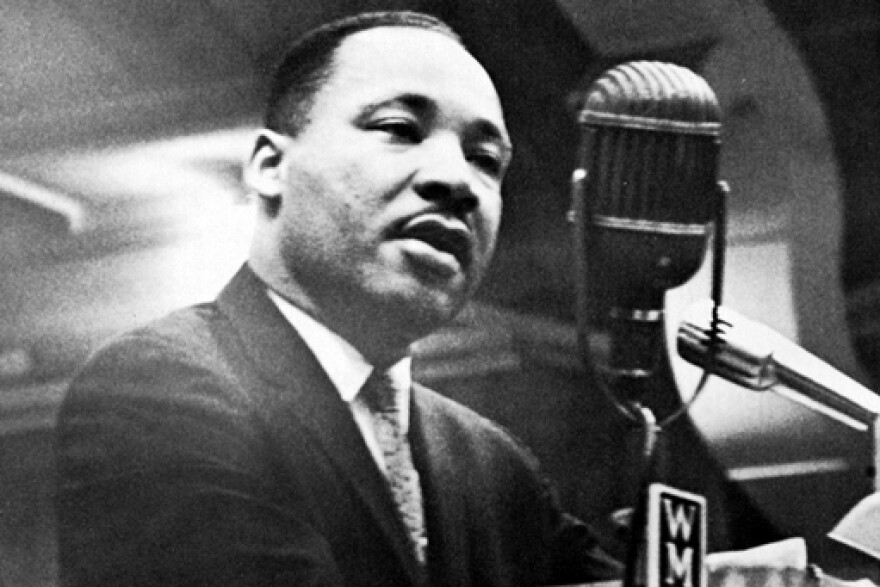Note: In honor of yesterday's 50th anniversary of the death of Martin Luther King, we're re-posting our Jan. 19, 2015 WestSouthwest show about him. Scroll down for short and extended web versions of the broadcast.
Did you know Dr. Martin Luther King Jr. spoke in Kalamazoo? And just four months after his historic “I Have a Dream” speech in Washington, D.C.?
WMUK'sEarleneMcMichael tells the inside story of what led to King's Dec. 18, 1963 visit to Western Michigan University today (1/19/15) on the WestSouthwest show. It is in honor of MLKJr. Day.
McMichael interviews Thomas Coyne, WMU’s retired vice president of student affairs who was a key administrator and adviser to the senior class at the university at the time of King's visit. It is a longer version of a piece that originally aired on Morning Edition on Nov. 25, 2013 on the occasion of the 50th anniversary of King's visit here, which was marked with a public program on the WMU campus.
Coyne, who had been on staff for just under a year at the time, says he remembers clearly the highly charged circumstances leading up to the invitation for King to speak. According to Coyne, the 1963 senior class had brought a controversial segregationist, then-Mississippi Governor Ross Barnett, to campus to speak, much to the consternation of some, including faculty members. So King was then asked to address the university community to provide an opposing view to Barnett, Coyne recalls. It was part of a lecture symposium sponsored by WMU’s Lee Honors College called “Conscience in America.”
Coyne says that the students had invited 30 prominent individuals in the news to talk at Western, but only Barnett responded. Although he says the senior class had blindsided both him and then-WMU President James Miller with their invitation to Barnett, Miller allowed the visit to proceed in the belief that it would provide the students with “a teachable moment."
About 2,000 people came out on a snowy night to Western's Read Fieldhouse to hear King at a critical time in American history. Firstly, President John F. Kennedy had been assassinated a month earlier. Secondly, it was four months after King had delivered his now famous “I Have a Dream” speech on the National Mall.
Coyne says one of the most poignant moments in King's presentation was his response to a question about what he thought the effect JFK’s death would have on the passage of the Civil Rights bill and on the Civil Rights Movement.
“King made a point of saying…that he thought it was likely that the (Civil Rights) bill would go ahead and be successful....that, in fact, President Kennedy might have been more successful after his death than he might have been before,” Coyne says. The retired administrator explains it made Kennedy reach "mythic stature."
He says King's words were more prophetic than the famed leader knew.
Five years later, King's own assassination spurred advancement for the cause of civil rights because “a number of individuals stepped into his footsteps,” in the same way that Kennedy's death was a catalyst for change, Coyne says.




